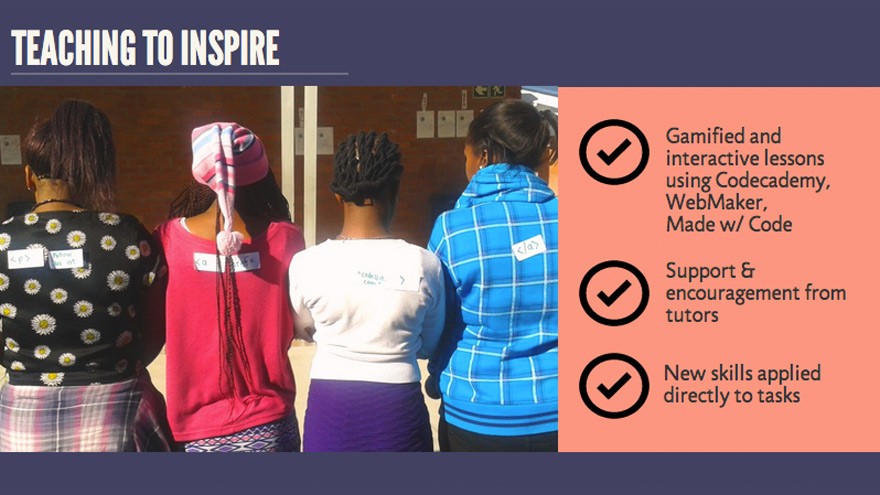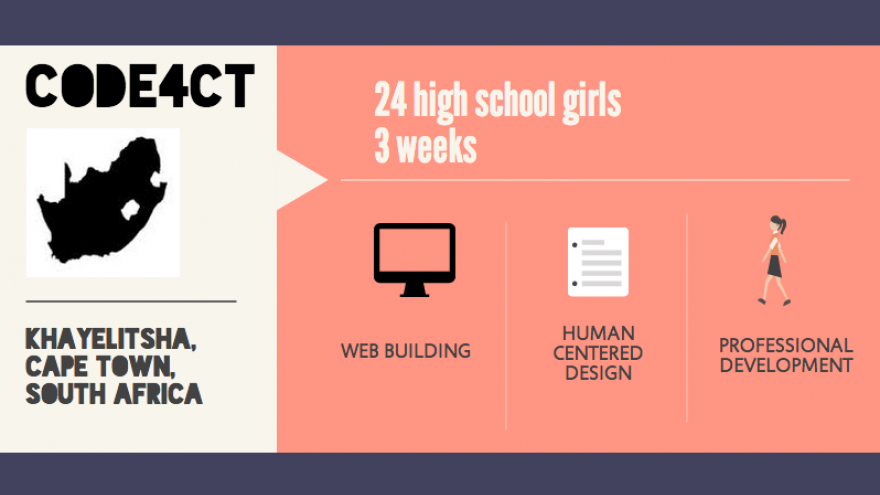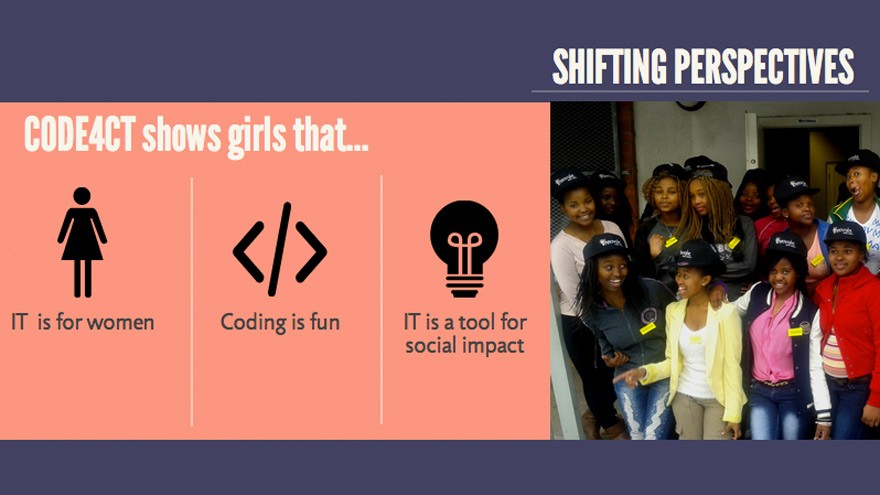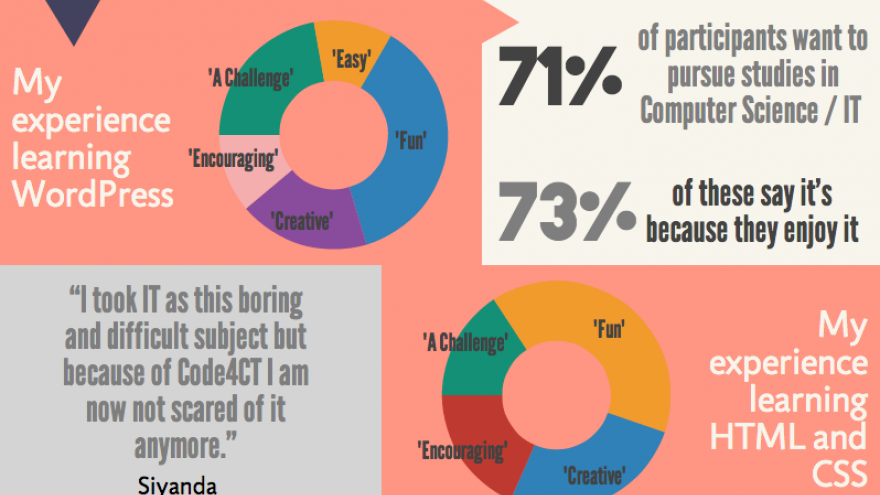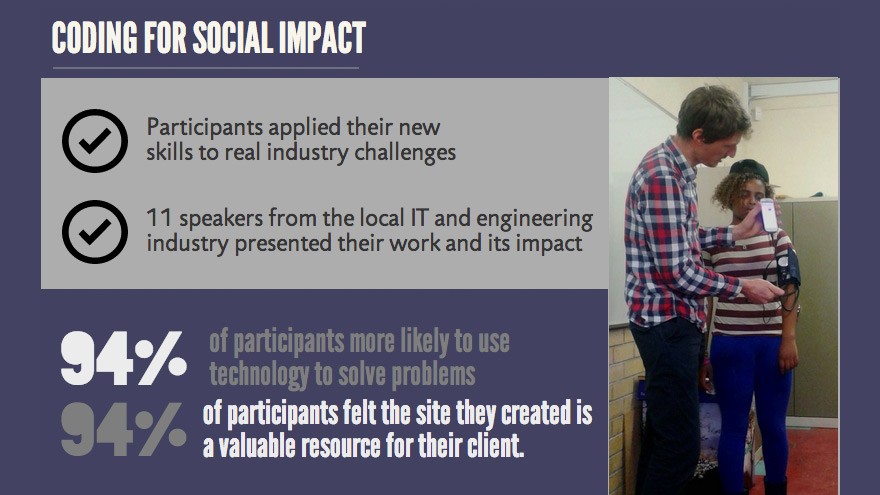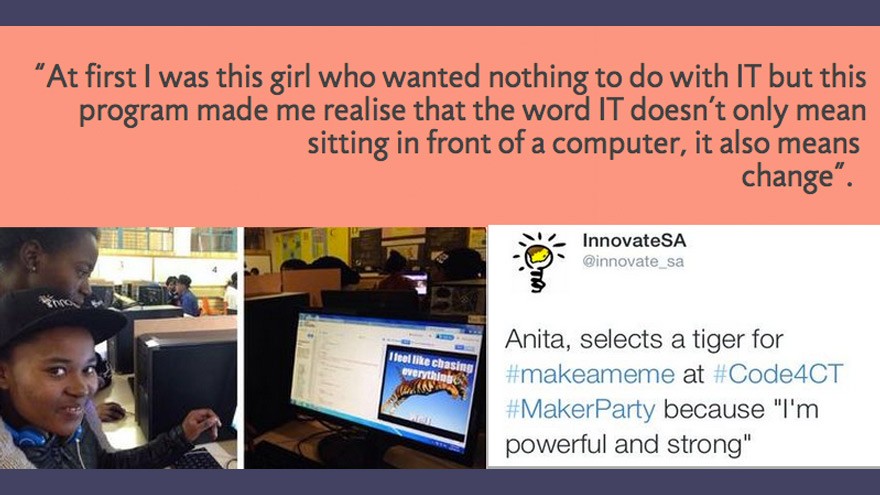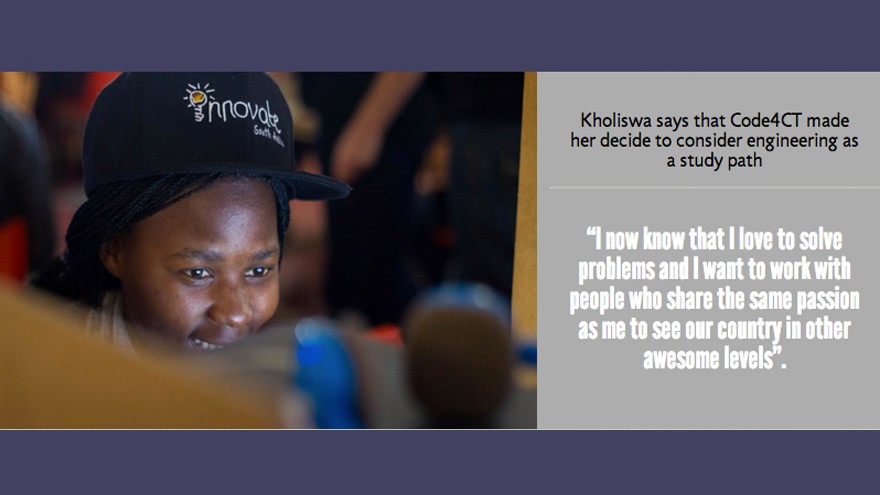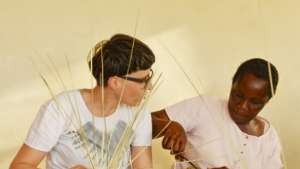From the Series
InnovateSA is empowering a generation of young girls with technical and soft skills through Code4CT, a three-week holiday programme launched in July 2014.
Emma Dicks, project lead on Code4CT and director of new initiatives at Innovate South Africa, tells us how their female-centric approach to teaching coding has set the wheels in motion for the newly launched programme to make an impact.
Code4CT is one of 17 projects funded by WeTech’s Seed Fund for Women + Girls in Computer Science (supported by Google), which aims to increase access for women and girls to computer science-related training, jobs and leadership roles.
More than just teaching technical skills, Dicks believes the programme is giving the girls a powerful toolkit for solving problems. It’s all about enabling them to find their own solutions to important real-world challenges and achieving high impact in the workplace.
Deliberately geared towards girls, the programme teaches coding and web skills in a way that frames them as tools to tackle social problems.
“I feel there is a disconnect between many women’s desire to make social change, and pursuing skills in STEM (Science, Tech, Eng, Maths)” says Dicks. “Women are naturally empathetic and often make career choices based on a social conscience and I believe this is one of the reasons the social sciences are flooded by women. So Code4CT starts by presenting girls with a real human need that needs solving, and then the participants learn to create and code the web as a means of creating a solution.”
I believe that if youth feel they have the ability to create change, a sense of great hope and purpose will grow among young people.
Code4CT is just one of several international programmes that targets girls in an attempt to close the very real gender gap in the technology sector. (A 2011 survey showed that only 12% of bachelor's degrees in computer science were awarded to women in the US – as opposed to 37% in 1984. In South Africa, a 2006 report revealed that only 20% of the Information and Communication Technology sector workforce is female.) Just last week, Samsung announced an initiative with the US non-profit organisation Girls Who Code (GWC), which will see the launch of a mobile app development competition, the "Samsung Mobile App Challenge", while Google launched Made with Code earlier this year to improve female representation in IT. Other US programmes include 100 Girls of Code, Black Girls Code and Girl Develop It, while the UK has a similar CodeFirst:Girls. Most of these offer free coding courses, mentorship and events to women and girls who want to learn web development.
The Code4CT model speaks in particular to the vitalness of education in developing countries. At Code4CT, high-school girls learn hard web building and design skills but – more importantly – how to self-teach. Though teaching coding for the web and professional internet skills, Code4CT also instills in the girls “soft” skills, such as professional communication (including interviewing clients, professional email correspondence, personal online presence and presentation skills), time management, group work and self-efficacy.
“The girls created email accounts, LinkedIn profiles and their own personal web pages,” she explains, speaking about their first three-week programme run this July.
“They learnt how to correspond professionally with their clients and delivered powerful pitches to these clients at the end of the programme. Probably the thing that made them feel most professional, though, was the fact that they each received a pack of personal business cards when they graduated. Finally, in terms of career readiness, we made a big attempt to show the girls how they can teach themselves skills.”
The feedback from the inaugural programme has been incredibly positive and suggests that the programme is both sustainable and scalable.
“Participants reported that the programme broadened their perspective about career opportunities and showed them that IT is an exciting career path with the opportunity for social impact,” she says.
“After the programme, 94% of participants said they were now more likely to try and use tech to solve problems,” says Dicks. “In fact, a group of the girls came up to me the other day and informed me that they had noticed that the websites of schools in Khayelitsha were ‘terrible’ and so they wanted to redesign them to be better resources. Whether or not they succeed with this project, the important thing to me is that they feel they have the ability to make an improvement to their own communities.”
Code4CT is specifically held in a local community space – not only to avoid the girls travelling far distances, but also to impart a sense of ownership of their newfound skills.
“By holding a programme in the participants’ own community, it builds the mindset that learning and problem solving is possible ‘at home’ and not in a ‘special’ environment,” says Dicks.
A challenge, however, has been internet connectivity, ever a challenge in many African dwellings outside of cities. “I ran the programme as close to the participants home as possible – at their school (COSAT) – but the internet barely functioned. This meant the curriculum ran very slowly.”
The Code4CT curriculum also aims to create a balance between skills acquisition and a fun learning environment.
Dicks shares with us some of the feedback from girls in the programme. Meet Thembeka, a thoughtful young girl who likes poetry and astronomy. This is what she wrote on Day 2 of the programme:
The lessons are full of enthusiasm, oomph, determination, curiosity and hunger to know more. They make me want to keep on learning and exploring. They have completely changed how I view programming and IT… It gave me a total outlook on how I see technology, problem-solving and problem identification.
It’s all so amazing, I mean, last week I learnt to code using HTML/CSS and now I HAVE A WEBSITE and I can BLOG about anything I want. Who would’ve thought that I’d have my own website and be able to make it the way I want it to be??
Well, this will be useful in the future, in different ways, I mean I can start my own little business and make other people’s websites fun and appealing. I don’t wanna say much except “WATCH THIS SPACE”. This is awesome!!!!!! *smiles*.
Because participants are reporting an increase in self-efficacy and increased motivation to pursue further skills development, these outcomes make the programme’s impact robust and sustainable, says Dicks.
The first group of 24 girls has attended several follow-up learning opportunities such as the Innovation Summit at Cape Town Stadium, the 2nd Annual PHP Youth Conference (Nxtgen Coders) and are attending GirlHype sessions. There will also be a follow-up holiday programme with them during their summer break.
As for Code4CT’s future, Dicks is currently in the process of planning a growth strategy for the coming year. She’s making every effort to design the programme to be lightweight and transferable and is testing the viability of scaling through first replicating the programme on other sites in Cape Town.
“Having proven the concept I am now moving away from a model that relies on donor funding and rather pursuing relationships with local industry. The tech industry has a huge dearth of talent, and I believe I can use Code4CT as a means of creating value for industry in this area,” Dicks ends.
Code4CT is also currently running a Thundafund campaign to garner more support. It runs until 26 November 2014.
For more information follow the Code for Cape Town blog.

